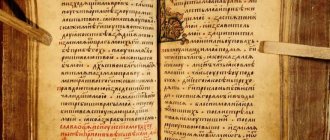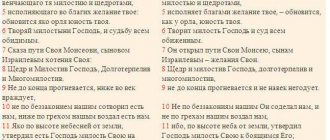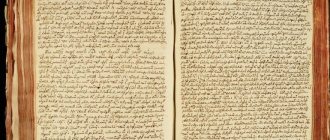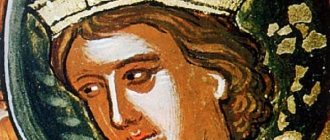There is an opinion among Russian Orthodox interpreters that Psalm 116 speaks allegorically about the history of Jesus Christ. Here is a prophetic thought that the second coming will save and change the world. The Apostle Paul used the text of Psalm 116 in his address to the Romans. Despite the fact that the Romans were pagans in those days, he believed that these lines also carried deep meaning for them. According to Paul, the pagans can also share with the believers the mercy of the Messiah, because this is why he came to earth to save and give hope to those who have not yet believed God.
Text of prayer Psalm 116
In Old Church Slavonic with accents
Alleluia
1 Praise the Lord, all nations, praise Him, all people,
2 For His mercy is established upon us, and the truth of the Lord endures forever.
In Russian
Alleluia
1 Praise the Lord, all you nations; glorify Him, all nations;
2 For great is His mercy toward us, and the truth of the Lord endures forever. Hallelujah
Psalm of David 116
Psalm 116 is the shortest of all the songs in the Psalter, but the most powerful in its content and glorification of the majesty and power of God.
The Meaning of Psalm 116
This song of praise is most often sung during temple services, not because of its brevity, but because of its power.
Other psalms of King David:
The Psalm of David is hope for all pagans and people of little faith to know the mercy of the Lord, to be filled with His spirit, to accept the sacrifice of Jesus Christ and to enter into eternal life.
1 Praise the Lord, all you nations; glorify Him, all nations; 2 For great is his mercy toward us, and the truth of the Lord endures forever.
Reading the shortest psalm, every believer hears:
- a call to give praise to the Almighty by all nations;
- support in spiritual struggle during a hectic life.
A song of praise can be called Psalm 116, which in just two verses calls on all nations to give constant praise to the Lord.
Articles about the Old Testament:
The psalmist emphasizes that all people speaking different languages and all nationalities can praise the Creator. This is an appeal to both believers and pagans.
Important! All humanity is given the right to exalt the Creator of heaven and earth for every day life, food and blood, children and health.
Interpretation of the Psalm
Praise Christ for His blood and sacrifice at Calvary. Praise God all people, and not just Jews, although Christ came first of all to save the children of Israel, and then all humanity.
In the first verse of David's psalm of thanksgiving 116 in Russian, a prophecy is revealed about the Church, the Bride of the Lord, who is first given the right to give praise to the Most High.
Jesus Christ came to earth to fill it with light, teaching the apostles throughout the earth to spread sparks of the Gospel, so that everyone who believes in Him would be saved and gain eternal life.
Why does the psalmist speak not of one people, the Jews, but of many? The Jews scattered throughout the world brought the news of the great Creator to every corner of the world, many accepted God's faith and, in the words of the prophet Zechariah (Zechariah 2:11), flocked to the Lord.
Having accepted the Creator as their God, abandoning the worship of gods, the pagans began to be called people in the eyes of the Almighty.
The Apostle Paul continues the thought of David in his letter to the Romans, he also divides the pagans and people. Praise the Creator, pagans, for everything that has been given to you, and people who have come to know the great power of the Creator can glorify the Almighty with all their hearts and their deeds.
Verse 2 proclaims the mercy of God on all who believe in the Creator, it does not cease from century to century.
Lives of Old Testament saints:
The humane Lord pours out His mercy on good people and evil, just as rain coming from heaven covers the righteous and the unrighteous.
The law of God became the basis of the gospel truth, giving the grace of Jesus Christ to the nations. No person can be saved by good works if there is no faith in the Lord in his soul. The Apostle Paul emphasizes that people are saved by the great mercy of God, the grace given by Jesus Christ, the Savior of men. People have sinned and will continue to sin, however, God's mercy is far greater than our evil deeds and sinful behavior.
Important! Every person is given the grace to accept Jesus Christ as their Savior, to repent and accept the Communion of the Body and Blood of Christ, his Calvary sacrifice.
The grace granted to all mankind through the open doors to repentance and acceptance of Christ calls upon the nations to give praise to God Most High.
Why read Psalm 116?
For a believer, Psalm 116 contains real miraculous power. When in trouble or suffering from anxiety, losing hope, a person turns to the sacrament of the Psalter. Matters of the heart were no exception, because nothing compares with the help of the psalms of David. Psalm 116 is recommended to be read to couples so that God will bless them for their family life together.
It is better to read the Psalter in a secluded atmosphere by the light of a lamp, freed from the bustle of the world and thoughts about everyday life. It would be correct to position yourself opposite the icons depicting the faces of saints. Such an atmosphere will allow you to truly feel the mystery and deep meaning of the psalms, will allow you to feel the filling mutual feeling, the feeling of happiness that will descend on the couple. God will bless those who ask with mercy, instilling a bright feeling in their souls, and their family will be preserved, and they will glorify and thank the Creator.
Psalm 116 - text in Russian, interpretation, read and listen
Psalm 116 is known as the shortest chapter not only in the Psalter, but in the entire Bible. It contains only two verses. Despite its brevity, it is interpreted by theologians on a par with longer chapters of Holy Scripture. It is also used in worship - not only in Orthodoxy, but also in other Christian denominations.
Psalm 116 - text in Russian
1. Praise the Lord, all nations! Sing His praises, all you people! 2. Because great is His mercy toward us and His truth endures forever. Hallelujah!
Text in Ukrainian
1. Praise the Lord, all nations, glorify Him, all peoples, 2. for His mercy has been bestowed upon us, and the righteousness of the Lord endures forever! Hallelujah! (Psalms 116:1,2)
General content
Known from the opening lines in Latin (Laudate Dominum omnes gentes). In the Church Slavonic version, it sounds like “Praise the Lord, all nations” (that is, all the peoples of the world). From the opening word - Hallelujah - you can understand that this psalm is one of praise. Western theologian Isaac Watts compiled a brief summary of the essence:
- All you who live under heaven, praise the Creator.
- The Redeemer should be sung in every language on earth.
- Lord, Your mercies are everlasting; the truth of Your word is also eternal.
- Praise will sound from shore to shore,
- Until the sun rises
- To never come again.
Russian theologians agree that Psalm 116 speaks allegorically about Christ. Prophetic lines foretell how the Lord's ministry will change the world after the second coming. Then the apostles will begin to pronounce their testimony in every corner of the Universe.
Interpretation of Psalm 116
This chapter of the Psalms was quoted by the Apostle Paul in his letter to the Romans. The Romans were pagans at that time, and Paul very accurately captured the general mood of the prophetic lines. They say that the pagans are also called to share with the chosen people the mercy of the Messiah. He came to earth not only to fulfill promises, but also to save everyone who is not yet familiar with God.
According to Ivan Lopukhin, a famous Russian theologian, Psalm 116 is a continuation of the previous two:
- Psalm 114 is the king’s personal appeal to the Lord;
- Psalm 115 - thanksgiving in the presence of Jews.
Previously, the author offers thanks and praise on behalf of his fellow Israelis. Through the lips of the psalmist an invitation sounds to all earthly tribes - the king offers to glorify the Lord of the universe. Appealing to the pagans who did not know Jehovah, the true God, testifies to David's deep faith.
David often uses the words hesed (mercy) and emeth (truth, faithfulness). These epithets refer to Immanuel. The prophet saw very clearly how the Lord worked in the world. Tribes who worship false gods must sooner or later turn away from them. The only question is when this blessed time will come, but for David there was no doubt that it would come. And with his appeal he is trying to speed up his arrival.
Christology of the Psalms
In many texts - no matter whether in Russian, English or Slavic - the prophets spoke about Christ. Of course, every Bible verse has both a literal meaning and a mysterious meaning. The entire Bible speaks in one way or another about the Coming of the Son of God.
There is a deep meaning in the first verse. In an amazing way, the prophet foresees events that will occur many centuries after his death. The Savior came, began to preach, and performed many miracles. He suffered and accepted death, sacrificed Himself, then the Resurrection occurred. Then, appearing to the apostles on the day of Pentecost, He gave them a great commission: to go to the ends of the earth and bring the Gospel.
- Today there is hardly a person who has never held the Bible in his hands. The New Testament has been translated into many languages and is available for study even to people who profess other religions. It was to them that King David addressed his appeal.
Why does the prophet suggest praising the Lord? For what He has done in our lives - for deliverance from the burden of sin and eternal death, for the opportunity to unite with Christ, for the fact that the gates of heaven are again open for believers. Jesus came down to our world so that its inhabitants could ascend to heaven. Through Jesus' sacrifice on the cross, people can make this ascent because He took upon Himself the burden of our sins.
- Text of Psalm 60;
- Interpretation of Psalm 3;
- Psalm 50 - how prayer helps.
How Christ changed the world
The entire history described in the Old Testament testifies that humanity is not able to save itself. The world was not getting better, things were getting worse and worse. Men and women were satiated with sinful pleasures; they ate, drank, and indulged in debauchery. Life without a Savior has no meaning because it has no spiritual direction. The Bible even tells us about human sacrifice. So society slipped lower and lower.
And then the incarnation of the Son of God took place. Thousands of souls reached out to Christ, because their souls needed his love. According to the Gospel, about 5 thousand people followed the Teacher. They all needed repentance, cleansing of conscience and joyfully accepted the Word. But the main thing that conquered Jesus was His love, boundless love for His creation. Not everyone could comprehend why a simple carpenter innocently ascended to Golgotha. This is too difficult and incomprehensible for many, but even for them there is a chance of salvation.
After the Resurrection of Christ, many things began to change, although not immediately. Christian communities appeared, then kings accepted the new faith, saints appeared, the first states based on faith in God. Today we really have something to say “Thank you, Lord!”:
- By the sacrament of Repentance, believers can clear their conscience;
- through Communion, accept into yourself a part of the Lord Himself;
- believers have the opportunity to be spiritually born of water and the Spirit.
After being born again, the personality is transformed and praise to God becomes a necessity.
About God's mercy
“For His mercy is established upon us, and the truth of the Lord endures forever,” we read in the second verse. This is the quality of the Creator that sinners most often remember. Because it was precisely this that became the reason that people have the opportunity to return to their heavenly fatherland.
Even ordinary everyday activities turn into punishment if you do not take blessings on them. You can work hard, but without the help of the Holy Spirit, your efforts will go to waste and there will be very little results. There is no spiritual progress either: the heart does not become kinder, mercy and love for one’s neighbor does not appear.
A person who does not know the Lord is always dissatisfied with something, is aggressive and turns his complaints to heaven. The unfortunate man does not understand why such torment is being sent to him. But everything is simple - there is no communication with Christ in his life. Another thing is a believer. He perceives all events, even unfavorable ones, in a different light. Through trials, the Almighty tries to teach us, cleanse us, and bring us closer to Himself. In fact, He never abandons those who are faithful to Him. Little Psalm 116 teaches us a lot.
Using text
Many great composers have adapted the words of the psalm to their own tunes:
- Claudio Monteverdi wrote melodies for solo and ensemble, and a bass aria.
- Antonio Vivaldi used the couplet in vespers for the Nativity of the Mother of God.
- Wolfgang Amadeus Mozart consulted the text twice to compose the Solemn Vespers (339 and 321). Both produced a part for soprano, sounding at a slow tempo.
At Orthodox services, the text of Psalm 116 is read before the choir begins to sing the stichera on “Lord, I have cried.” Jews use these lines as part of a prayer of thanksgiving, expressing praise to the Creator.
Listen to Psalm 116
Interpretation
Ivan Lopukhin, a famous Russian theologian, in his studies suggested that Psalm 116 continues the theme that the author developed in Psalms 114 and 115. The psalmist begins by addressing God personally, then thanks him in the presence of the Jews. The author goes further and writes this psalm, laying in it important meaning and power.
- Verse 1-2: Due to the brevity of the kathisma, there is no point in dividing it into separate verses when interpreting it. In this psalm there is a call to all the tribes of the Earth to praise and recognize the one God; King David again confirms his faith and love for the Creator, confessing this to him and the whole world again and again. David does not call to thank God without reason, because his deeds are great, and his mercy to all peoples is boundless, the truth permeates the entire Earth and glorifies him. The psalmist is confident that pious feelings and thoughts support the soul of Orthodox people and help them survive adversity.
Using prayer in music
Catholics also have a psalm as part of the evening service. Among the composers who set his text to music:
- A. Vivaldi;
- W.A.Mozart;
- modern composers A. Pärt, K. Penderecki.
Archpriest Andrei Tkachev, in the broadcast of the Ukrainian channel KRT “Garden of Divine Songs” on May 20, 2008, called the 116th prophecy not only fulfilled, but continuing to be embodied daily . After all, now all nations glorify the Lord. Let us remember this while listening and reading this short but very deep text.
Natalia Sazonova
Reading rules
Psalm 116 is sung quite often during services, this is explained by the strength and power inherent in its content and glorification of God. Despite the fact that this psalm is the smallest in the entire Psalter, its significance is very high.
It's quite enjoyable to read. Thanks to its brevity, you can quickly understand its meaning, even with poor knowledge of the Church Slavonic language. However, the church does not at all prohibit reading the Psalter in the Russian Synodal translation, if this is necessary for study and knowledge; the main thing is to follow the rules of the sacrament of reading and reflect on the prayer read. Psalm 116 is of great importance for every believer, and therefore is often used in prayers.
( 1 ratings, average: 5.00 out of 5)
Psalm 116 Psalm
This psalm is short and sweet. I do not think that we sing it so often because it is short, but if we understand and reflect on it correctly, we should sing it even more often, since it is very pleasant, especially for us sinners among the heathen, since it demonstrates favor shown to us.
I. It is a solemn exhortation to all nations to glorify God (v. 1).
II. A good cause of praise is offered (v. 2). We would soon become weary of good works if, while singing this psalm, we did not maintain the pious and reverent feelings by which the spiritual sacrifice of praise should be kindled and sustained.
Verses 1-2 . This psalm contains a significant part of the Gospel. The Apostle equips us with the key to it (Rom. 15:11), where he gives it as a proof that the Gospel should be preached and accepted by the Gentile nations, which was the great stumbling block to the Jews. Why does this offend them so much, since the Scripture speaks about it, and they themselves often sang: “Praise the Lord, all you nations, glorify Him, all nations.” Some Jewish commentators say that this psalm refers to the kingdom of the Messiah; moreover, one of them imagined that it consists of two verses to emphasize that in the days of the Messiah God will be glorified by two groups of people - the Jews, according to the law of Moses, and the Gentiles, in accordance with the seven commandments of the sons of Noah, who at the same time should form one Church, just as these two verses form one psalm. Here we are presented:
I. The vast space occupied by the Evangelical Church (v. 1). For many centuries, only in Judah was God known and His name glorified. The sons of Levi and the seed of Israel praised Him, but the rest of the nations praised the gods of wood and stone (Dan. 5:4), while on their part, as far as we know, they did not worship the living true God, at least openly. But here all nations are called to glorify the Lord. These words cannot be attributed to the time of the Old Testament, since this call at that time could not be addressed to any pagan people (much less to all) in a language that they would understand, and on the basis that the people were not allowed to glorify God along with the Jews until they were circumcised and thus became Jews. But the Gospel of Christ had to be preached to all nations, because thanks to Him the dividing wall fell, and those who were far off became near. This was a mystery hidden in prophecy for many centuries, but at last it was revealed and it was accomplished that the Gentiles became joint heirs (Eph 3:3,6). Please note here:
(1) who will be admitted into the Church - all nations and all nations. The original uses the same words as for the rebellious nations and tribes who plotted against Christ (Ps. 2:1); those who were enemies of His kingdom should become His willing subjects. The gospel of the kingdom was to be preached throughout the whole world as a witness to all nations (Matt 24:14; Mark 16:15). All nations will be called; for some nations the call will be effective and they will become disciples.
(2.) As it was foretold that they would be admitted into the Church, by a repeated appeal to glorify Him. The good news of the Gospel sent to all nations will give them a reason to glorify God; the establishment of gospel ordinances will give them permission and opportunity to glorify God, and the power of gospel grace will give them suitable hearts to glorify Him. Those whom God has invited by His word and inclined by His Spirit to glorify Him are especially favored, and thus become His glory and praise (Jer. 13:11; see Rev. 7:9,10).
II. The unsearchable riches of gospel grace, which should be the substance of our praise (v. 2). It is in the Gospel that the attributes of God, mercy and truth, shine most brightly in themselves and most favorably for us; and the apostle, quoting this psalm, draws attention precisely to them, as to two great truths for which the pagans should praise God (Rom. 15:8,9) - for the truth of God and mercy. We, the generation that delights in the gospel, have reason to praise the Lord, (1.) For the power of his mercy: for his mercy is great toward us; she is strong (emphasizes the meaning of the word), she is powerful for the forgiveness of grave sins (Amos 5:12) and for the accomplishment of great salvation.
(2) For the eternity of His truth: “The truth of the Lord endures forever.” It was a great mercy that the Gospel was sent to the Gentiles. This mercy shown to them far exceeded what they deserved; and in him the truth of the Lord - the truth of His promise to the fathers - abides forever, for although the Jews were hardened and driven out, at the same time the promise came into force for the believing Gentiles - the spiritual seed of Abraham. God's mercy is the source of our comforts, and His truth is the basis of our hopes, and therefore we should praise the Lord for them.
Authorship
Theodoret applies this psalm to the afflictions of the Jews during the time of the Maccabees under Antiochus Epiphanes[8][9] while a small minority attributes it to Hezekiah, a disease recorded in Isaiah 38[10]
However, today most commentators attribute it to King David. If David were the author, it is unknown whether it was composed for any specific occasion.[11] or after a general account of the many merciful deliverances which God had wrought for him, of the six troubles and the seven[12] The Syrian church holds that it was written on the occasion of Saul approaching the cave where David was hiding[13]
Recommendations
- Derek Kidner, Psalms 73–150, Tyndale's Old Testament Commentary (Downers Grove, IL: InterVarsity Press, 1975), 411.
- William D. Barrick, Psalms, Hymns, and Spirituals: Tunes of a Master Musician. (Placerita Baptist Church, 2007).
- Calvin's Commentaries, vol. 11: Psalms, part IV, at sacred-texts.com
- Coffman's Bible Commentary.
- Coffman's Bible Commentary.
- psalm 116 test.
- Psalm 116 text.
- Psalm 116, John Gill's Commentary on the Whole Bible.
- Exposition of the Bible by John Gill.
- Calvin's Commentaries, vol. 11: Psalms, part IV, at sacred-texts.com
- Jerome Creech, Commentary on Psalm 116.
- Psalm 116, Commentary by Matthew Henry.
- Adam Clarke's Bible Commentary - Psalm 116].
- Complete Artscroll Siddur page 636
- Jerome Creech, Commentary on Psalm 116: 1-2, 12-19.
- Complete Artscroll Siddur, page 619
- Kirkpatrick, A.F. (1901). The Book of Psalms: With Introduction and Notes
. Cambridge Bible for Schools and Colleges. Book IV and V: Psalms XC-CL. Cambridge: University Press. item 840. Received February 28, 2019. - Commentary/reflection by Pope John Paul II on Psalm 116:10-19
- Exposition of the Bible by John Gill.
- Commentary/reflection by Pope John Paul II on Psalm 116:10-19.
- Commentary on Psalm 116.
- D'après le Complete Artscroll Siddur, collection of the first children.
- translation by de Prosper Guéranger, Regle de Saint-Bénédic, Abbaye Saint-Pierre de Solesmes, reimpression 2007) p. 47,
- The main cycle of liturgical prayer lasts four weeks.
- Psalm 116, Commentary by Matthew Henry.
- Charles H. Spurgeon, Psalm 116, Treasury of David.
- Calvin's Commentaries, vol. 11: Psalms, part IV, at sacred-texts.com
- Luke 22:17.
- 1Co 10:16.
Language
Psalm 116 without title in Hebrew.[3] The psalm was translated into Septuagint Greek (c. 250 BC) in Hellenistic Egypt. There is the presence of Aramaism in the psalm, which some have interpreted as evidence of a late date,[4] although this is not conclusive. The psalm borrows so heavily from other psalms that Hupfeld called it a “revised psalm.”[5]
Psalm 116 in Hebrew begins with (אָהַבְתִּי כִּי יִשְׁמַע יְהוָה אֶת קוֹלִי תַּחֲנוּנָי) (I love that the Lord will hear my voice and my prayers)[6] And in Hebrew there is an acrostic verse. It is considered one of the so-called Egyptian Hallel.
Structure
Few Christian churches follow a chapter division based on the Septuagint, where verses 1-9 Psalm 114
and verses 10-19
Psalm 115
. It is accepted as the Greek Septuagint (250 BC) and the Latin Vulgate (400 AD).
in Hebrew Psalm 116 (116 תְּהִלִּים) begins with (אָהַבְתִּי כִּי יִשְׁמַע יְהוָה אֶת קוֹלִי תַ ּחֲנוּנָי) (I love that the Lord hears my voice and my prayers) [7] and is an acrostic Verse. The psalm is one of the so-called Egyptian Hallel prayers.
Psalm 145
1: Praise the Lord, my soul. 2: I will praise the Lord as long as I live; I will sing to my God as long as I exist. 3: Do not put your trust in princes, in the son of man, in whom there is no salvation. 4: His spirit departeth, and he returneth unto his land: in that day all his thoughts shall perish. 5: Blessed is he who has the God of Jacob as his helper, whose hope is in the Lord his God, 6: who made the heavens and the earth, the sea and all that is in them, who is ever faithful, 7: who brings justice to the oppressed, who gives bread to the hungry. The Lord loosens the prisoners, 8: The Lord opens the eyes of the blind, the Lord raises up those who are bowed down, the Lord loves the righteous. 9: The Lord protects the stranger, supports the fatherless and the widow, and perverts the way of the wicked. 10: The Lord shall reign forever, O thy God, O Zion, to generation and generation. Hallelujah.
Famous Poems
- Verse 11: “I hastily said that all men are liars,” can be read as an early statement of the liar paradox.
This verse has also been translated: “I said in my fear, “Everyone is a liar.” and “In the ecstasy of despair,” I said, “all mankind is a delusion.” Some use the word חפז (chaphaz) to denote haste or flight rather than fear, while Horsley translates this verse as "ecstasy of despair".[27]
- I'll sacrifice praise
- The cup of salvation
is a phrase used by Catholics as a prophecy of the Eucharist. Although some see this as similar to modern times, the Jewish ceremony is held every year to commemorate the liberation of their ancestors from slavery in Egypt. Others see this passage as a reference to the offering of the morning drink to Solomon's Temple under the Law of the Mosaic (Numbers 28:7), suggesting that the writer is now making a thanksgiving offering for its provision.
Others think that this verse may have inspired Jesus[28] at the Last Supper or Pauls' "Cup of Blessing",[29]






